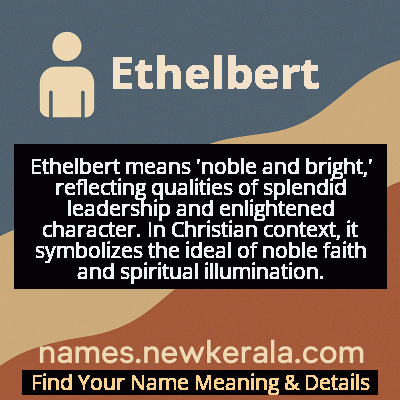Ethelbert Name Meaning & Details
Origin, Popularity, Numerology Analysis & Name Meaning of Ethelbert
Discover the origin, meaning, and cultural significance of the name ETHELBERT. Delve into its historical roots and explore the lasting impact it has had on communities and traditions.
Name
Ethelbert
Gender
Male
Origin
Christian
Lucky Number
5
Meaning of the Name - Ethelbert
Ethelbert means 'noble and bright,' reflecting qualities of splendid leadership and enlightened character. In Christian context, it symbolizes the ideal of noble faith and spiritual illumination.
Ethelbert - Complete Numerology Analysis
Your Numerology Number
Based on Pythagorean Numerology System
Ruling Planet
Mercury
Positive Nature
Adventurous, dynamic, curious, and social.
Negative Traits
Restless, impatient, inconsistent, prone to indulgence.
Lucky Colours
Green, white.
Lucky Days
Wednesday.
Lucky Stones
Emerald.
Harmony Numbers
1, 3, 9.
Best Suited Professions
Sales, marketing, travel, entertainment.
What People Like About You
Versatility, charisma, adventurous spirit.
Famous People Named Ethelbert
Ethelbert of Kent
Anglo-Saxon King
First English king to convert to Christianity and established Canterbury as center of English Christianity
Saint Ethelbert
Martyr and Saint
King of East Anglia martyred for his Christian faith, venerated as a saint
Ethelbert I of Wessex
Anglo-Saxon King
Ruled Wessex during turbulent Viking invasions, maintained Christian kingdom
Ethelbert Nevin
Composer
American romantic composer known for 'The Rosary' and other popular piano works
Name Variations & International Equivalents
Click on blue names to explore their detailed meanings. Gray names with will be available soon.
Cultural & Historical Significance
Throughout English history, Ethelbert remained a name that evoked both noble lineage and Christian commitment, particularly in aristocratic and religious contexts. Its usage reflected the blending of Germanic tribal traditions with Christian values that characterized the development of English identity. The name's association with multiple Anglo-Saxon saints and kings reinforced its status as a name denoting leadership, faith, and cultural significance. In later centuries, particularly during the Victorian era, Ethelbert experienced a revival as part of the broader interest in Anglo-Saxon history and names, though it never regained its early medieval popularity.
Extended Personality Analysis
Individuals named Ethelbert are often perceived as possessing a dignified and principled character, combining traditional values with intellectual depth. They typically exhibit strong leadership qualities, moral conviction, and a sense of responsibility toward others. The historical weight of the name suggests someone who is reliable, thoughtful, and capable of making significant decisions with careful consideration. Ethelberts are often seen as bridge-builders between tradition and progress, much like the historical King Ethelbert who balanced pagan heritage with Christian innovation.
These individuals tend to be respected for their integrity and often assume positions of influence where their judgment and stability are valued. While sometimes perceived as serious or formal, they possess an inner warmth and commitment to community welfare that earns them lasting respect. The name carries expectations of wisdom, reliability, and the ability to guide others through challenging transitions. Ethelberts are often drawn to roles that require both practical leadership and ethical consideration, reflecting the name's dual meaning of noble authority and enlightened perspective. They typically approach life with a sense of purpose and historical consciousness, valuing continuity while recognizing the need for thoughtful evolution.
Modern Usage & Popularity
In contemporary times, Ethelbert is considered a rare and distinctive name, primarily used by families with strong historical or religious connections. Its usage peaked in the late 19th century during the Victorian revival of Anglo-Saxon names but has since become quite uncommon. Today, it is occasionally chosen by parents seeking a unique name with deep historical roots and Christian significance. The name appears most frequently in academic, historical, or religious contexts rather than mainstream usage. Modern parents who choose Ethelbert typically value tradition, uniqueness, and the name's connection to early English Christianity. While not appearing on popular baby name charts, it maintains a niche appeal among those appreciating historical names with substantial meaning and character.
Symbolic & Spiritual Meanings
Ethelbert symbolizes the harmonious union of noble heritage and spiritual enlightenment. The name represents the bridge between ancient traditions and new faith, embodying the concept of enlightened leadership and cultural transformation. Symbolically, it suggests someone who carries the light of wisdom while honoring their ancestral legacy. The 'noble' element speaks to dignity, honor, and responsibility, while the 'bright' component represents clarity, intelligence, and spiritual illumination. In Christian symbolism, Ethelbert embodies the ideal of the Christian ruler—someone who governs with both temporal authority and spiritual insight. The name carries connotations of stability during transition, wisdom in decision-making, and the capacity to guide others through significant change while maintaining core values and traditions.

